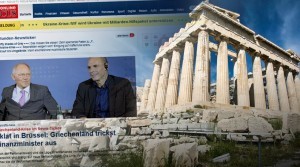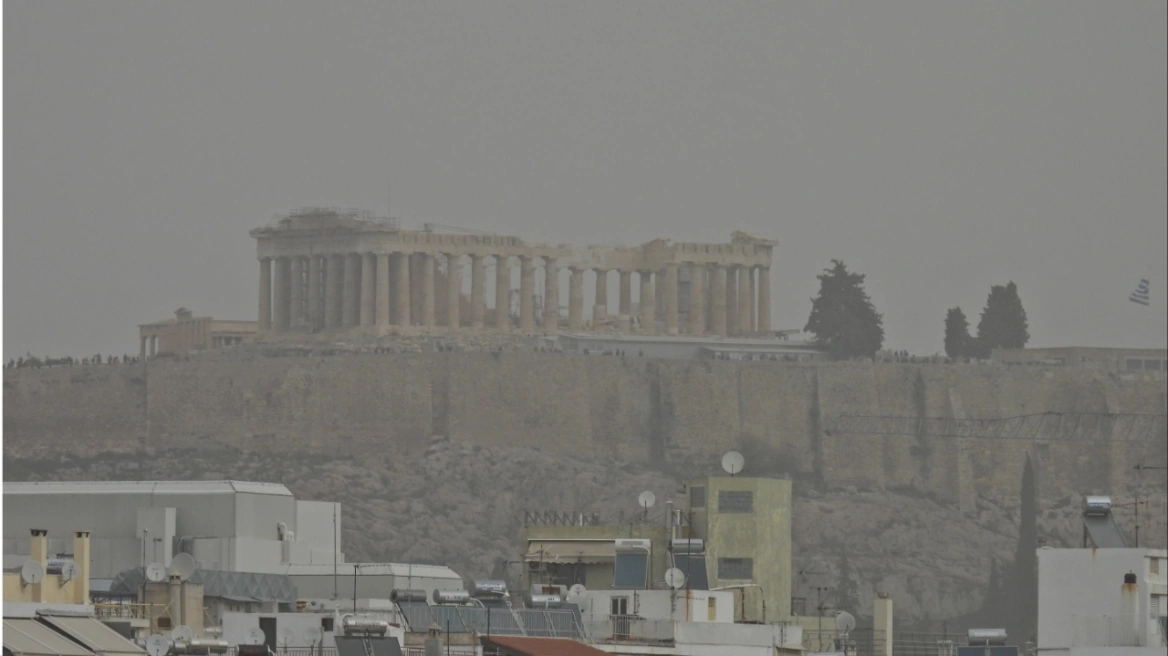Heightened press attention focused on the extraordinary Eurogroup meeting Wednesday evening, given the paramount repercussions on the internation economy from the ongoing attempts by the new Greek government to work out a new financing plan with its institutional lenders — a plan devoid of the word “austerity”.
The German press as well as most other international media reported that there may be hope for a solution on Monday. Several US, British and French media reported an impasse regarding the Greek proposals — or framework of proposals — aired at Wednesday night’s meeting.
The new leftist Greek government is adamantly opposed to any extension of the current bailout scheme, instead forcefully promoting what it calls a “bridge agreement”, which mostly entailed continued access to ECB liquidity for Greek banks, raising the ceiling on T-bill issuance, reducing the target for a primary budget surplus and using Greek bonds at collateral vis-a-vis the ECB, amongst others.
Deutsche Welle
“Expectations are low that a solution will be reached this week. Tsipras is due to debate the issue with his fellow European Union leaders at a summit on Thursday, with the Eurogroup due to reconvene for a decisive meeting on Monday,” a DW dispatch read, adding that the majority of EU FinMins are on the German side. “Time is running out for Greece, with the European portion of its rescue package due to expire at the end of the month. Athens is rejecting talk of an extension to the program, running up against fiscally conservative countries such as Germany, which have rejected the idea of wholesale changes to bailout deals.”
Focus
The German magazine Focus said Greek FinMin Yanis Varoufakis “duped” the Eurogroup. The magazine states that Greece cancelled austerity following the Jan. 25 elections, putting the German credit line and German subsidies in danger. The magazine quotes CSU Interior Minister Hans-Peter Friedrich as stating that the “Greeks are acting like hooligans!”
Furthermore the magazine underlines that the Greek government really doesn’t have a plan. “Finance Minister Yanis Varoufakis will need to lay down specific proposals on the table at the next Eurogroup meeting on Monday. They need to slowly realize that they are responsible for the situation.”
Der Spiegel
Der Spiegel’s main article, entitled “Hard landing (to reality) for populists”, refers to the negotiation tactics of the government of Prime Minister Alexis Tsipras. The newspaper states taht it hardly shows that Varoufakis knows games theory (due to his previous work with the Valve Corporation). “The wide European tour after the SYRIZA victory was, based on the result, a lesson on how not to negotiate.” “SYRIZA’s plan is not going to pay off, despite the hasty meetings of the Eurogroup,” predicts the newspaper. “The new Greek government has already abandoned the claim for mowing and will soon have to show the same flexibility in the promise it made for the end of the aid package. Neither will they be able to abolish or revoke the reforms. This in principle is bad for the credibility of SYRIZA. But it could be good for the credibility of Europe, if those responsible in Brussels, Berlin or Paris use their power for a policy towards Greece that will not be black-and-white.”
Guardian
The British newspaper’s rolling report expressed disappointment as Greece and its eurozone partners didn’t even release a statement about its bailout program. The newspaper refered to leaked information from the telephone contact from Tsipras to Varoufakis to stand his ground. The Greek Finance Minister was uncharacteristically quiet during his entry into and exit from the Eurogroup meeting. The newspaper stresses that if a solution is not found by the end of the month, Greece risks being without liquidity.
Bloomberg
“Greece needs its next bailout installment of about 7 billion euros ($7.9 billion) or some other financing to keep from defaulting on its international debt payments. The new, anti-austerity government of Prime Minister Alexis Tsipras has said it no longer wants to abide by the terms of the bailout program, asking instead for bridge funding while negotiating a new deal,” writes Bloomberg, adding that negotiations would continue despite the polar opposite views of Greece and Germany. In another report from Brussels and Berlin, Bloomberg maintains that the EU partners are in orbit towards a solution between Greece and its international creditors.
CNN
CNN reports that an agreement is still far away following discussions and focuses on the bridge program.
Wall Street Journal
The newspaper writes that there was no joint statement after six hours of talks, however there is hope that an agreement may be reached by Monday.
New York Times
“Eurozone finance ministers failed to narrow their deep differences with Greece on Wednesday over how to keep the country from running out of money as it tries to revise the terms of its bailout. After holding more than five hours of talks here with Yanis Varoufakis, the combative finance minister from the newly elected anti-austerity government in Athens, the ministers said they would need to meet again on Monday,” reports the NYTimes, refering to a statement by Eurogroup Chief Jeroen Dijsselbloem, who said that there has to be a political agreement on the way forward before concrete negotiations can get underway.
CNBC
The newspaper pointed to the rejected Greek draft, stating that talks would continue on Monday. “A draft statement by euro zone finance ministers on how to handle Greece’s finances spoke of ‘extending’ its current bailout deal as a ‘bridge’ to a new package, according to a copy of the draft that was rejected by Athens. The new Greek government, elected on a mandate to end deeply unpopular international bailout terms, has insisted there can be no “extension” once that deal expires at the end of the month. But EU partners fear financial chaos without such an accord.”
ABC
The Australian network pointed out that Greece was unable to reach an agreement but that there are hopes for this at Monday’s meeting. There was a focus on the rejected statement and threats that Greece may seek financial aid from Russia or China that would further tangle the situation. The uncertainty surrounding Greek debt has had a negative effect on the markets.
French Newsagency
The French newsagency has a photo of the people showing their support to the government at Syntagma Square while stressing that an agreement was not reached between Greece and its EU partners.
Le Figaro
An article on the deadlock last night with a photograph of International Monetary Chief Christine Lagarde smiling with Greek Finance Minister Yanis Varoufakis.
Ask me anything
Explore related questions





